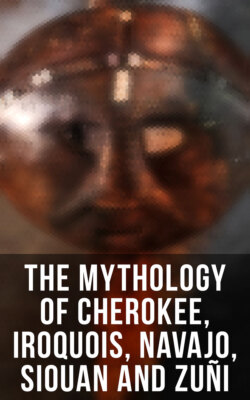Читать книгу The Mythology of Cherokee, Iroquois, Navajo, Siouan and Zuñi - James Mooney - Страница 8
На сайте Литреса книга снята с продажи.
The First Indians in Europe
ОглавлениеAlmost immediately upon the discovery of the New World its inhabitants became a source of the greatest interest to all ranks and classes among the people of Europe. That this should have been so is not a little surprising when we remember the ignorance which prevailed regarding the discovery of the new hemisphere, and that in the popular imagination the people of the new-found lands were considered to be inhabitants of those eastern countries which European navigation had striven so long and so fruitlessly to reach. The very name 'Indian' bestowed upon the men from the islands of the far western ocean proves the ill-founded nature and falsity of the new conditions which through the discovery of Columbus were imposed upon the science of geography. Why all this intense and vivid interest in the strange beings whom the Genoese commander carried back with him as specimens of the population of the new-found isles? The Spaniards were accustomed to the presence and sight of Orientals. They had for centuries dwelt side by side with a nation of Eastern speech and origin, and the things of the East held little of novelty for them. Is it not possible that the people, by reason of some natural motive difficult of comprehension, did not credit in their hearts the scientific conclusions of the day? Something deeper and more primitive than science was at work in their minds, and some profound human instinct told them that the dusky and befeathered folk they beheld in the triumphal procession of the Discoverer were not the inhabitants of an Orient with which they were more or less familiar, but erstwhile dwellers in a mystic continent which had been isolated from the rest of mankind for countless centuries.
There are not wanting circumstances which go far to prove that instinct, brushing aside the conclusions of science, felt that it had rightly come upon the truth. The motto on the arms granted to Columbus is eloquent of the popular feeling when it states,
To Castile and Leon
Columbus gave a new world,
and the news was greeted in London with the pronouncement that it seemed "a thing more divine than human"—a conclusion which could scarcely have been arrived at if it was considered that the reaching of the farthest Orient point alone had been achieved.
The primitive and barbarous appearance of the Indians in the train of Columbus deeply impressed the people of Spain. The savage had before this event been merely "a legendary and heraldic animal like the griffin and the phoenix." In the person of the Indian he was presented for the first time to the astonished gaze of a European people, who were quick to distinguish the differences in feature and general appearance between the Red Man and the civilized Oriental—although his resemblance to the Tartar race was insisted upon by some early writers.
Popular interest, instead of abating, grew greater, and with each American discovery the 'Indian' became the subject of renewed controversy. Works on the origin and customs of the American aborigines, of ponderous erudition but doubtful conclusions, were eagerly perused and discussed. These were not any more extravagant, however, than, many theories propounded at a much later date. In the early nineteenth century a school of enthusiastic antiquaries, perhaps the most distinguished of whom was Lord Kingsborough, determined upon proving the identity of the American aborigines with the lost Ten Tribes of Israel, and brought to bear upon the subject a perfect battery of erudition of the most extraordinary kind. His lordship's great work on the subject, The Antiquities of Mexico, absorbed a fortune of some fifty thousand pounds by its publication. The most absurd philological conclusions were arrived at in the course of these researches, examples of which it would but weary the reader to peruse. Only a shade less ridiculous were the deductions drawn from Indian customs where these bore a certain surface resemblance to Hebrew rite or priestly usage.
